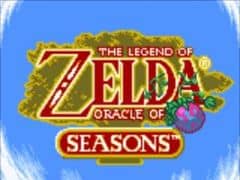Video Gamer is reader-supported. When you buy through links on our site, we may earn an affiliate commission. Prices subject to change. Learn more
I would hate to be accused of assuming on other people’s behalf, but I imagine the ‘Oracle Of’ games are probably among the best Zelda titles a lot of people have never played. It’s not your fault either. Oddly difficult to get over a decade ago, today is the day to right those wrongs by downloading them from the 3DS eShop. Welcome to the future.
An anomaly at the time – and to this day all things considered – Nintendo did the unthinkable back in 2001 by handing development over to Capcom. Following a similar setup to the Game Boy’s Link’s Awakening, the real appeal was, and thanks to this re-release is again, how the two titles interact and cross over with one another. Individuals who invest time in both will open areas, and the ‘proper’ ending, that are only accessible by doing so, a concept that remains quite novel even in 2013.
With that said, the two aren’t completely different from one another, meaning you’re going to need reason to journey through both Oracle Of Ages and Oracle Of Seasons. Breaking it down as much as possible, the former focuses on puzzles while the latter is more about action. Although that sounds like a nice mix – and it certainly is – there is a very similar thread running through each.
You’d have to be blind not to notice the same environments, plot points or ideas slowly blending together but, to be honest, it just doesn’t matter. The two games are so well crafted and intelligently put together that you can play them back-to-back and still feel like you’re getting a brand new experience.
As the titles allude to, this is all due to how you can alter the environment. With Ages, this revolves around the idea of travelling between the present day and the past thanks to a magic harp. Much like, say, A Link To The Past, this shifts the layout of the map meaning, essentially, the game is just one giant puzzle as you figure out when and where you have to time travel.
It’s the same thread for Seasons, too, only now you’re controlling the weather. With power now shifting to a unique rod, it’s, once more, down to figuring out which parts of the world suit what weather. For example, during winter, a tree that has shed its leaves will gain you access to a path that’s not accessible at any other time.
While all these novelties are imperative to the core idea and what distinguishes them from other entries in the series, it’s the expected Zelda elements that make these so damn good. Dungeons are excellently put together, the use of the franchise’s much loved inventory is awesome and the story, while a little on the light side, is intelligently constructed given that it spans across two entirely separate games. Capcom may have its name side-by-side on the title screen with Nintendo, but this doesn’t feel out of place in the slightest. For many, they may even prefer it.
The interactivity between the two is certainly the high point, and if you missed out over a decade ago and genuinely want to understand why there was such fuss then that’s the only way to play it. Even if you dip into just one, though, the Oracle titles remain a cut above.
